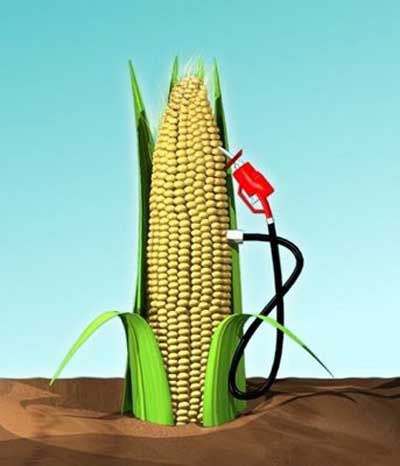Almost three weeks ago, the U.S. Senate voted to end subsidies for production of ethanol, the alternative fuel that is largely refined from domestically-grown corn.
At the time, conventional wisdom had it that this was a safe move. Because the subsidies were attached to a stalled economic development bill, they weren't likely to go anywhere.
But the vote let Senators go on record as cutting a widely-criticized subsidy program.
The conventional wisdom, it seems, may prove to have been wrong.
The Wall Street Journal reports today that agreement has been reached to let the 45-cents-per-gallon ethanol blending credit expire at the end of this month, along with a tariff on ethanol imports of 54 cents per gallon.
The end of the subsidy is expected to save approximately $2 billion over several years, two-thirds of which will be applied to cutting the national debt. That $1.3 billion represents roughly 0.1 percent of the total national debt of $14.3 trillion.

Corn Ethanol Pump
In earlier years, Brazilian ethanol producers would have been ecstatic at the removal of the import tariff, which has made that country's ethanol exports unaffordable in the U.S.
But with global sugar prices high, Brazil isn't likely to have surplus ethanol in the near future anyhow.
Which raises the question: If ethanol isn't subsidized, will there be adequate production to meet the steadily increasing Congressional mandates for ethanol consumption?
In 2007, Congress passed the Energy Independence and Security Act, which mandates usage of 36 billion gallons of ethanol in vehicle fuel by 2022. That's more than three times last year's 11.1 billion gallons used. By 2015, the requirement rises to 15 billion gallons.
Today's compromise, according to the Journal, was negotiated among Senators Dianne Feinstein (D-CA), Amy Klobuchar (D-MN), and John Thune (R-SD).
The group of three is not only bipartisan, but includes two Midwestern supporters of farming subsidies in general.
That a consensus appears to have been reached so soon after real action was written off indicates both how unpopular the ethanol subsidies had become--on fiscal, food policy, and environmental grounds--and how intense the budgetary pressure on Congress is now.
[Wall Street Journal (requires subscription)]
+++++++++++













